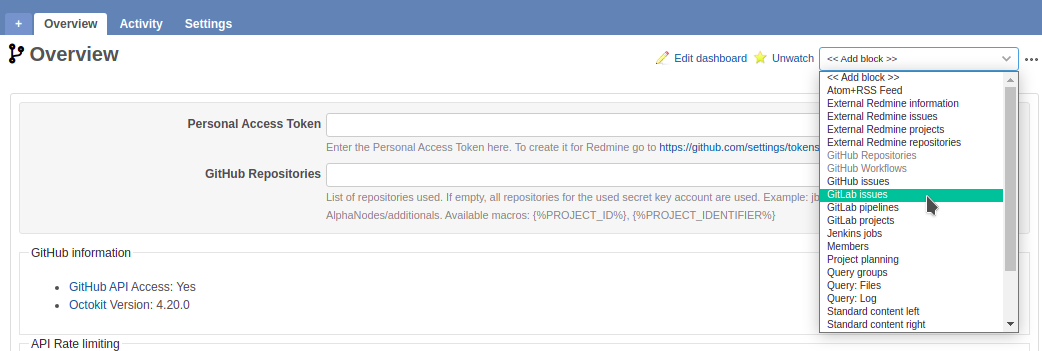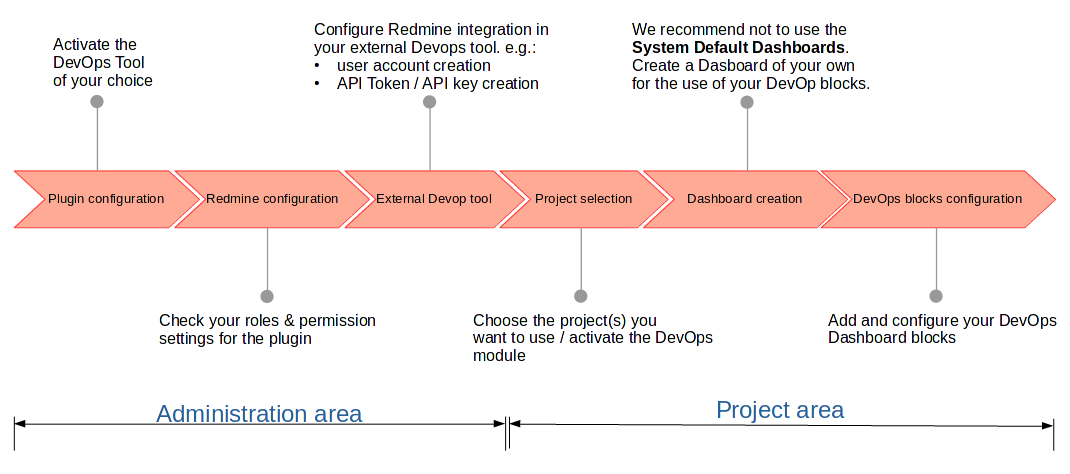Developing software applications or web applicactions today involves more than just writing code. Developers are often also entrusted with operational tasks, such as creating and maintaining infrastructures.
Moreover, the person who initially developed an application is not always the one responsible for its further maintenance.
This fact alone requires that every project member is involved in all processes. Or at least has insight into them. Even if individuals are not directly involved in the development, but their tasks are based on it.
Since not every project participant has access to external DevOp tools such as GitLab, GitHub or Jenkins due to their role, other solutions should be used to enable project managers and employees outside of development to access project-relevant information.
The DevOps plugin gets everyone back on track and acts as an information hub for your project. This is the only way to effectively manage your entire team, because the relevant information continues to flow together in Redmine.
Visualize relevant information on your Redmine dashboard
Easily add relevant information of your external DevOps / GitOps Tool to your project dashboard in Redmine. So you create a (personal) view of the most important issues, actions and changes of your external tool within Redmine.
 Simply add relevant information as dashboard block to your project overview page
Simply add relevant information as dashboard block to your project overview page
Supported DevOp Tools for integration into Redmine
According to a 2019 survey of Statista on Programming / development tools used by software developers worldwide from 2018 to 2019 more then 80% work with source code collaboration tools like GitHub and GitLab.
And in the section of Continuous Integration (CI) or Continuous Delivery (CD) tools like e.g. Jenkins are ranging on 4th place with more than 45% of the developers using those.
The DevOps Plugin supports the information integration into Redmine of the following tools, regularly used for software development worldwide:
- GitLab (Merge Requests, Pipelines, Projects and Issues)
- GitHub (Pull-Requests, Repositories, Issues and Workflows)
- Jenkins (Failed Jenkins Jobs)
- Zabbix (Zabbix Hosts and Problems)
- External Redmine Systems (Repositories, Issues, Projects, System information)
The tool integration into Redmine is easy. To show GitHub, GitLab, Jenkins, Zabbix or external Redmine information in your Redmine project management tool, you need to:
- activate the prefered tool in Redmine for a specific project and
- connect your external account in your dashboard block settings.

Afterwards your project team will be able to view those information according to their user specific roles and permission within your Redmine project overview page.
The advantage of dashboard support is that in addition to a publicly accessible dashboard, each employee can easily create their own dashboard with their personal account information (if necessary).
Who is it recommended for?
The DevOps plugin is suitable for companies with cross-functional IT and business teams that use Redmine as a project management tool and simultaneously use at least one of the supported DevOps tools. Then you always keep an eye on the status of the external DevOps application from within Redmine, without having to leave Redmine.
All information about our extensions for Redmine is available on the product page. The commercial DevOps plugin is available in a cheaper bundle. It requires the Reporting Plugin. Customers whose Redmine does not meet the minimum requirements or who prefer to hire someone to install and regularly maintain their Redmine instance have the alternative to book our Managed Application Hosting for Redmine. Here, the plugin is already part of our hosting offering. The functionality can be tested extensively in our online demo.
